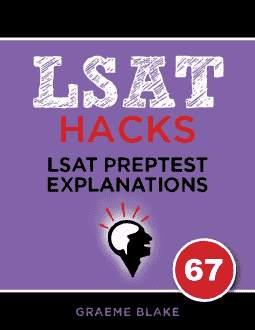DISCUSSION: See the last sentence of paragraph 3. The author is shocked that ethnographic literature ignores women’s stories about women.
‘Salutary’ means ‘good’, but you don’t need to know that to see that the author approves of Shostak’s approach to women’s stories about women.
___________
- Quite the opposite. The author likes the fact that Shostak has focussed on women’s views of women.
- We only know Shostak discusses women’s views of women. As far as we know, most ethnographers ignore this perspective.
- CORRECT. This paraphrases the last sentence of paragraph 3.
- The ethnographic studies might use some information available from those interviews. What the studies do not do is present the information from the point of view of women’s views about women.
- Actually, most ethnographic literature ignores individual experience entirely (first few lines of paragraph 1). This answer is false, and is irrelevant to presenting women’s views about women.


(D) is a better answer.
You would argue that “how much” implies “most,” and you’d lose the argument. If I mentioned that a surprisingly large proportion of the North American population died from cancer along those lines—”It’s a shock to learn how many North Americans die of cancer”—there’s absolutely no justification for an implication of “most.” A mere twelve percent of the population could die from cancer and it would be shocking, and yet we’re nowhere close to a majority.
Meanwhile, “shock” is a direct synonym for “surprise,” and while the reference to “interviews” limits (D)’s relevance somewhat, (C)’s “most” puts it way out of bounds.
“Salutary” means something “unwelcome or unpleasant” that took a turn for the better. C captures the essence of lines 40-43 (which talks about ethnographic literature deals with views of women). “Most” is fine in this case since the question is asking for what “best expresses” the author’s opinion.
The passage doesn’t mention the author is surprised that individual interviews aren’t used. There’s nothing in the passage to support this.
You can also see that c, d, and e are talking about different groups of studies.
c talks about ethnographic literature
d talks about ethnographic studies about women
e talks about ethnographic studies of women’s views about women.
The support lines 41-43, only talk about ethnographic lit in general. It may be that the groups of studies referenced in d and e actually do use these techniques, but are only a very small portion of the total of studies.
Correcting auto correct on phone issues in my last post:
I also get your explanation, but don’t quite get why the ‘glaring’ issues with C that cause it not to be a ‘perfect’ match can’t also be used to explain why D can’t also be seen as right despite it’s non perfectness.
Surprising = ‘salutary shock’ in line 41, and ethnographic studies ‘of women’ similarly causing D not to be perfect as compared with C also not being perfect due to reasons you’ve outlined.
Hi,
Does C fail the fact test? It says “It is unfortunate that most…”, and I can’t find any mention of most in the text. The line about the salutary shock could refer to 40% (thus, not most) of literature omitting that perspective.
I am grateful for any clarification you might offer.
You’re right — it’s not a perfect match. The passage says “how much ethnographic literature” omits the perspective of women on women’s issues, whereas the answer choice says “most ethnographic literature”.
There’s two points I’d used to justify this answer choice:
(1) Each of the other answer choices have multiple glaring issues (outlined in the explanation) that make this choice the best of five
(2) I’d argue “how much ethnographic literature” implies “most”. If over 50% of ethnographic literature did include the perspective of women on women’s issues, then it’s very unlikely that the author would say something like “it is a salutary shock to realize how much ethnographic literature omits the perspective of women about women”. To say that it’s a shock does seem to imply that this is a more widespread problem (“most”).
I also get your explanation, but don’t quite get why the ‘glaring’ issues with C that cause it bit to be a ‘perfect’ match can’t apart be used to explain why D can’t also be seen as right despite it’s no perfectness.
Surprising = salutary shock in line 41, and ethnographic studies ‘iof women’ similarly causing D not to be perfect as compared with C also not being perfect.
Does it also help you case that D specifies “ethnographic studies of women” while C and the quote are more broad, theytalk about all ethnographic literature. (?)
Those are actually equivalent. Studies and literature have broadly the same meaning.
The more vital shift between the answers is that C correctly talks broadly about women’s view on women. Whereas D is specific to interviews. The author would view interviews as an example of a technique but not the only important thing.
Note: this is an older comment but I wanted to address the point.